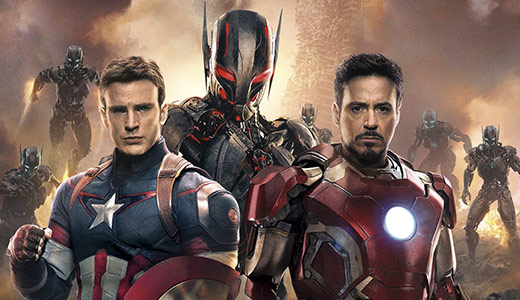Warm up the cash registers and credit card swipe machines. The Avengers: Age of Ultron will roar into theaters this Friday, and I think its weekend will look a little like founding member Hulk: big and green.
I’m eagerly awaiting Adam Holz’s review on Marvel’s latest blockbuster (it’ll land on the site later tonight). But in the meantime, I thought I’d offer some preliminary thoughts on the Avengers—particularly how their exploits contain, for me, just a whiff of the Old Testament.
Now, I’ve written a lot about superheroes here and elsewhere over the years, and in my new book, Burning Bush 2.0: How Pop Culture Replaced the Prophet, I spend a chapter talking about how superheroes follow a divine call a little like we all do. They (and we) are chosen for special work. But they (and we) must also choose to follow our call. For us, I think the critical element here is our choice—the thing we control. (You can read an excerpt from the book on that very topic here.)
But the original calling is just as important. And it occurs to me that there’s something a little Judge-y about our favorite Avengers. That is, their fictional roles remind me a little of what we read about in the book of Judges.
If you cruise through Judges, you’ll see a couple of recurring themes. One, the Israelites do something really dumb, so God punishes them. Two, the Israelites call out to God for help, so God sends them a deliverer—someone specifically called to save the Israelites from their own self-made problems.
When you look at the Avengers (Captain America, Hulk, Iron Man, Thor, Black Widow, Hawkeye), they too seem “built” to deliver the world from some truly dastardly threats. Each time a massive enemy rises up to put the screws on humankind’s collective thumb, some guy in a cape or metal suit pops up to save the day. Hydra Nazis in Europe? Thanks, Captain America. Gigantic metallic beastie in New Mexico? Why, hello, Thor. Alien invaders from above? Hey, why doesn’t the whole team band together to take ’em on?
But the comparison goes a step deeper than just the biblical idea of an Old Testament champion rising to save the day. Just as the Israelites were the authors of their own problems, we see that same dynamic in many of our Avenger-centric superhero stories.
Take the first Iron Man movie, for instance: Tony Stark creates his super suit to combat evil elements found within his own arms manufacturing company. In Captain America: The Winter Soldier, we learn that Hydra has wormed its way into S.H.I.E.L.D., which had previously been the good guys. In the original Thor and The Avengers, Thor’s brother Loki is the primary bad ‘un, and he successfully manipulated power brokers on Asgard and on Earth to further his evil plans. And we all know that Hulk is his own worst monster.
In each case, our heroes fight evil extraordinarily close to home—evil that often, in some small way, they helped create or foster. We see elements of that in this trailer for Age of Ultron, too:
“Everyone creates the thing they dread,” Ultron solemnly intones. Tony, it’s suggested, created Ultron. And now he and his friends must stop it.
It’s interesting that, so often in these cinematic superhero stories, we manufacture our own problems, just as we often do in real life. But we find hope in these stories, too. Hope that a deliverer (or, in Age of Ultron’s case, several) might come to help us out.






Recent Comments